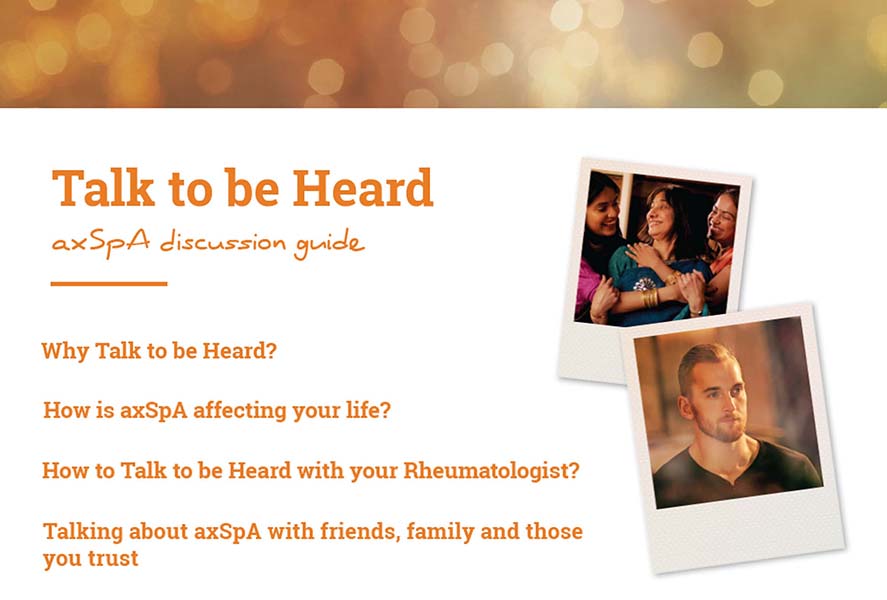Talk to be Heard
Despite a low general awareness and understanding of axial spondyloarthritis (axSpA), it is not a rare disease, with up to 1 in 150 people affected by it1.
This suggests that there could be over 50 million people living with axSpA across the globe. After years of living with the condition, it can be natural for people to stop talking about how the disease affects them – with their loved ones or even their rheumatologist.
AxSpA is a life-long inflammatory arthritis,
where the primary symptom is back pain.
AxSpA is an umbrella term that includes
non-radiographic axial spondyloarthritis (nr-axSpA)
and ankylosing spondylitis (AS).
Talk to be Heard aims to:
Change the dialogue between people living with axSpA and their support system, from friends and family, to their rheumatologists and other healthcare professionals
Inspire people living with axSpA to speak openly about their disease beyond symptoms
Validate the experiences of living with axSpA, demonstrating that there is a worldwide community of people with similar experiences
Foster confidence and encourage people with axSpA to have honest conversations with their doctors and loved ones

Find out more about the impact and burden of axSpA from the perspective of people living with the condition here.
Make the time to talk about your axSpA. Talking through how it affects you with your rheumatologist and / or a loved one is an important step to take in prioritising yourself and your health. Talk to be heard!
Because by talking to your rheumatologist about the realities of your axSpA, you can work together to improve your care
Because being open and honest with those who love you can help make life easier when you’re struggling
Because by sharing your experiences, you could help others living with axSpA too
Due to the way axSpA affects a person’s body, it can have a devastating impact on all aspects of everyday life, particularly when it comes to work, family, and relationships2.
Explore the stories of people living with axSpA below.
Emotional Impact of axSpA
Personal Goals and axSpA
Working with axSpA
Relationships
How to Talk to be Heard
Talking about how axSpA affects you with your rheumatologist and loved ones can be hard.
Did you know that one third of people living with axSpA had not discussed their care goals with their doctor?3
The Talk to be Heard discussion guide provides practical advice on how to handle these conversations. By talking openly about the realities of your axSpA with your rheumatologist, you can work together to improve your care and help your family and friends to support you.
Download this guide, available in a range of languages, for support in how to effectively communicate the impact of axSpA on your everyday life to loved ones and to your rheumatologist.
Talk to be Heard is independently endorsed by the following patient organisations,
who are ASIF members:
References
1. Stolwijk C, van Onna M, Boonen A, et al. Global Prevalence of Spondyloarthritis: A Systematic Review and Meta-Regression Analysis. 2016. Arthritis Care Res; 68(9):1320-31
2. The burden of axial spondyloarthritis: a global patient perspective; ASIF, January 2024
3. ASIF data on file




































